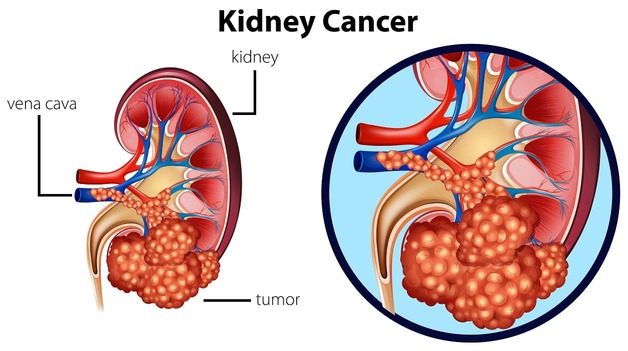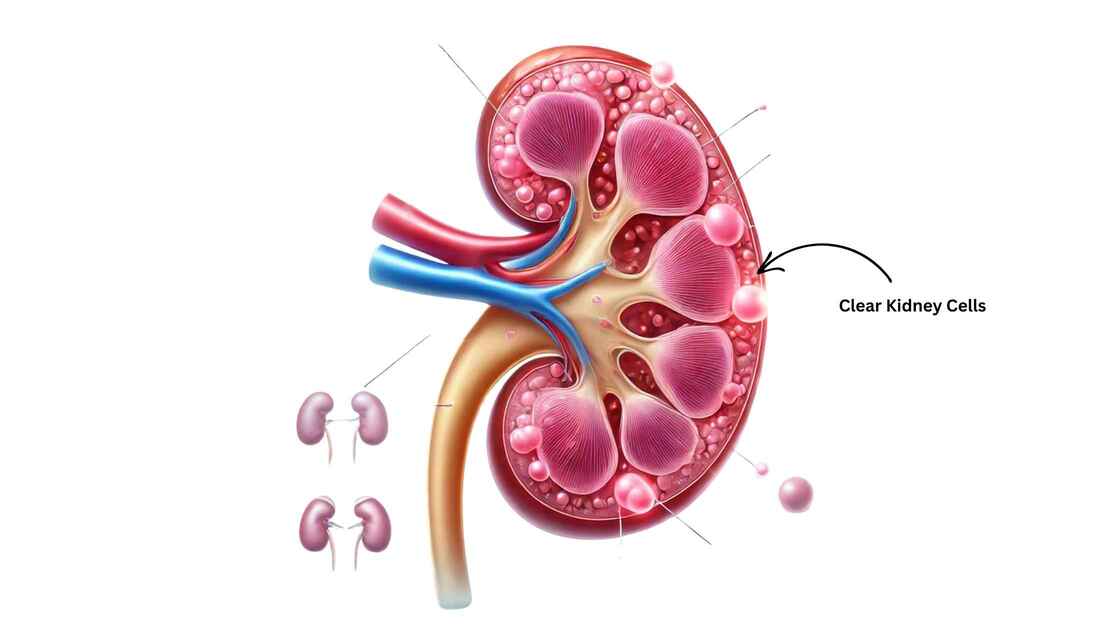Survival for Kidney Cancer: What You Need to Know

Table of Content:
- Understanding The Factors That Affect Kidney Cancer Survival Rates
- Kidney Cancer Survival Rates by Stage
- The Importance of Early Detection in Improving Survival Rate for Kidney Cancer
- Treatment Options for Kidney Cancer by Stage and Their Impact on Survival Rates
- Research Advancements and Emerging Therapies for Kidney Cancer Treatment
- Lifestyle Changes and Supportive Care for Improving Kidney Cancer Survival Rates
- Valuable Tips for Kidney Cancer Patients
- Conclusion and Key Takeaways
- FAQs
Kidney cancer survival rate is influenced by a range of factors, each playing an individual and collective role in determining outcomes for kidney cancer patients.
When it comes to kidney cancer, having accurate information about the stage of kidney cancer is crucial in making treatment decisions and determining survival rates. If you are a patient, caregiver, or simply interested in learning more, understanding these survival rates of kidney cancer can provide valuable insights.
In this article, Dr. Rohan Patel, one of the leading uro-oncologists and kidney cancer specialists in Ahmedabad, India, will break down kidney cancer survival rates and the latest treatment updates in 2025 to help you with all the information you need to make the right treatment decision for kidney cancer.
At the end of this blog, you will know about the following:
- factors that can influence survival rates
- Survival of kidney cancer by stage and age
- latest treatment of kidney cancer in all stages
- importance of early detection
- valuable tips for managing the disease
Understanding The Factors That Affect Kidney Cancer Survival Rates
Multiple factors influence kidney cancer survival rates, each playing a role in determining survival for patients.

Stage of Kidney Cancer
One of the primary determinants of survival for kidney cancer is the stage at which the cancer is diagnosed.
Early-stage kidney cancer (Stage 1 and 2) is typically associated with higher survival rates of more than 90%, while advanced stage Kidney Cancer (Stage 3 and 4), where the cancer may have spread to other parts of the body, present greater challenges in terms of treatment and prognosis. Therefore, understanding the stage of kidney cancer at diagnosis is crucial for assessing potential outcomes.
Health and Age of the Patient
Another significant factor determining kidney cancer survival rate is the overall health and age of the patient.
Younger patients are generally healthy and have fewer comorbidities. Thus, they often have better kidney cancer survival rates compared to older patients or those with underlying health issues.
The overall health of a patient can affect their ability to tolerate treatments, recover from surgeries, and respond to therapies, there by impacting their kidney cancer prognosis.
This highlights the importance of assessing not just the cancer itself but the individual's complete health profile when evaluating survival chances.
Histological Type of Kidney Cancer
The histological type of kidney cancer also has an effective effect on survival rates. For instance, clear cell carcinoma, the most common type of kidney cancer, has a better 5-year survival rate and prognosis compared to other subtypes like papillary or chromophobe carcinoma.
The genetic makeup of the tumor, including specific mutations and markers, can also provide insights into how aggressive the cancer is and how well it may respond to various treatments.
Understanding all of these factors can empower patients and families to make informed decisions regarding their care.

Consult Anhemdabad’s Top Uro-oncologist Today to Learn More:
Kidney Cancer Survival Rates by Stage
Kidney cancer is categorized into distinct stages, each with its unique survival rate.
Stage 1 Kidney Cancer Survival Rate:
In Stage 1 Kidney Cancer where the cancer is confined to the kidney and is relatively small, upto 7 cm, the five-year survival rate is up to 90%. This means that 70 to 90 out of 100 people diagnosed with stage 1 kidney cancer will survive up to 5 years.
This high rate reflects the effectiveness of treatment options available, including surgery, which is often the primary approach for localized tumors. Surgical intervention at this stage can lead to excellent outcomes, and many patients may remain cancer-free for extended periods following treatment.
Stage 2 Kidney Cancer Survival Rate:
In Stage 2 Kidney Cancer where it is still localized but larger than 7 cm, the five-year survival rate is up to 80% (50-80%). This means that 50 to 80 out of 100 people diagnosed with stage 2 kidney cancer will survive up to 5 years.
Treatment options at this stage still primarily involve surgical removal of the tumor via Partial nephrectomy(removal of only cancerous part) or Radical Nephrectomy(removal of entire tumour affected kidney), and many patients can achieve cure. However, the larger size of kidney cancer may require more advanced surgical procedures with robotic assisted surgery, which can improve overall outcomes.
Stage 3 Kidney Cancer Survival Rate:
In Stage 3 Kidney Cancer where the cancer may have spread to nearby lymph nodes, the five-year survival rate is up to 70% (20-70%). This means that 20 to 70 out of 100 people diagnosed with stage 3 kidney cancer will survive up to 5 years.
At this stage, treatment may involve a combination of radical nephrectomy surgery, targeted therapies, and immunotherapy. The complexity of treatment options and the potential for recurrence necessitate a comprehensive approach by an experienced uro oncologist.
Stage 4 Kidney Cancer Survival Rate:
In Stage 4 Kidney Cancer where the cancer has metastasized or spread to distant organs like liver, lungs, bones, brain; the survival rate significantly declines. The five-year survival rate is up to 20% (0-20%). This means that up to 20 out of 100 people diagnosed with stage 4 kidney cancer will survive up to 5 years.
This stage typically requires aggressive treatment strategies, including systemic therapies, and underscores the critical importance of early detection and intervention.
Learn how a patient of kidney cancer benefited from robotic surgery (robot assisted partial nephrectomy) and was able to save their kidney
Book An Appointment with Our Kidney Cancer Specialist in Ahmedabad, India to Learn More:
The Importance of Early Detection in Improving Survival Rate for Kidney Cancer
Early detection of kidney cancer plays a crucial role in improving survival rates and overall outcomes for patients. When kidney cancer is diagnosed at an initial stage, it is often asymptomatic, making routine screenings and awareness about risk factors essential.
For individuals at higher risk of kidney cancer such as
1. Those with a family history of kidney cancer
2. Genetic conditions like von Hippel-Lindau Disease(VHL), Tuberous sclerosis(TS), Hereditary papillary RCC, Familial leiomyomatosis and RCC, Birt-Hogg-Dubé syndrome
Regular screening for kidney cancer can lead to earlier diagnosis, significantly increasing the likelihood of successful treatment.
Advancements in imaging technologies for the detection of kidney cancer, such as CT scans, and MRI, have greatly increased the ability to detect kidney tumors at earlier stages. These imaging modalities allow for the identification of small tumors that may not yet be causing symptoms.
If these tumors are found early, they can often be treated effectively with Nephron sparing surgery (NSS) alone, leading to better long-term outcomes and improved quality of life post-treatment.
Moreover, the focus on public education regarding kidney cancer symptoms and risk factors can contribute to earlier diagnoses.
Symptoms of early kidney cancer, such as hematuria (blood in urine), persistent back pain, unexplained weight loss, and fatigue, should prompt individuals to seek medical evaluation from a urologist or uro-oncologist near them.
By increasing awareness and encouraging proactive health behaviors, the chances of identifying kidney cancer in its early stages can be enhanced, ultimately leading to a better survival rate for kidney cancer and more favorable prognosis for patients.
Treatment Options for Kidney Cancer by Stage and Their Impact of Treatment Modalities on Survival Rates
The treatment options for kidney cancer have evolved significantly in recent years, offering various options that can significantly impact survival rates.
Surgical intervention remains the cornerstone of treatment, particularly for localized kidney cancer. Procedures such as partial nephrectomy, where only the tumor and a small margin of healthy tissue are removed, and radical nephrectomy, which involves removing the entire kidney, have proven effective in improving survival rates.
The choice of surgical approach depends on the tumor's size, location, and the patient’s overall health.
Learn more about Partial nephrectomy or Nephron Sparing surgery for Kidney Cancer
Learn more about Radical Nephrectomy or Kidney Removal surgery for Kidney Cancer
In cases where surgery is not feasible due to the advanced stage of kidney cancer or the patient's health status, systemic therapies become crucial.
Targeted therapies that focus on specific pathways that cancer cells use to grow and survive, have shown promise in improving outcomes for patients with advanced kidney cancer. Agents like tyrosine kinase inhibitors (TKIs) have been revolutionary in extending survival by slowing cancer progression and managing symptoms.
Immunotherapy is another emerging treatment option that has transformed the management of kidney cancer. By harnessing the body's immune system to fight cancer, immunotherapy has demonstrated remarkable success in patients with metastatic disease. Treatments such as checkpoint inhibitors have led to durable responses and improved survival rates for many patients, even those with late-stage cancer.
Research Advancements and Emerging Therapies for Kidney Cancer Treatment
The field of kidney cancer research is rapidly evolving, with numerous advancements and emerging therapies showing promise in improving survival rates. Clinical trials play a crucial role in evaluating new treatment options and understanding their efficacy in various patient populations
Recent studies have also focused on the genetic and molecular profiles of kidney cancer, paving the way for personalized medicine approaches. By identifying specific genetic mutations associated with kidney cancer, researchers can develop targeted therapies that are more effective for individual patients. This shift towards precision oncology is revolutionizing the treatment landscape, offering hope to those with advanced or difficult-to-treat cancers.
Moreover, advancements in minimally invasive surgical techniques, such as robotic-assisted nephrectomy, are improving surgical outcomes and reducing recovery times. These innovations allow for more precise kidney cancer removal with less trauma to surrounding tissues, which can lead to better overall survival rates and quality of life for patients. As research continues to uncover new insights and therapeutic options, the future looks promising for improving outcomes for individuals affected by kidney cancer.
Book an appointment with Top Robotic Surgeon in India for Robotic surgery for kidney cancer:The continuous advancement in treatment options for kidney cancer underscores the importance of consulting a urologist or uro oncologist who can provide a personalized treatment plan tailored to individual patient needs and cancer characteristics.
Lifestyle Changes and Supportive Care for Improving Kidney Cancer Survival Rates
In addition to medical treatment, lifestyle changes and supportive care are essential in improving kidney cancer survival rates. Patients are encouraged to adopt a healthy lifestyle with a balanced diet rich in fruits, vegetables, whole grains, and lean proteins.
Nutritional support can help bolster the immune system, improve overall health, and aid in recovery during and after cancer treatment. Maintaining a healthy weight and engaging in regular physical activity can also contribute positively to a patient’s well-being and resilience against disease progression.
Psychosocial support is another critical aspect of managing kidney cancer. Emotional and mental health can significantly impact a patient’s ability to cope with diagnosis and treatment. Support groups, counseling, and therapy can provide patients and their families with resources to navigate the emotional challenges of cancer. Engaging with others who have similar experiences can foster a sense of community and understanding, ultimately leading to improved mental health outcomes and enhanced quality of life.
Additionally, integrating complementary therapies such as yoga, meditation, or acupuncture can help patients manage symptoms and side effects of treatment. These practices can reduce stress, improve sleep, and enhance overall well-being, which may indirectly influence survival rates.
By addressing the holistic needs of kidney cancer patients, including physical, emotional, and social aspects, supportive care can play a vital role in improving outcomes and enriching the patient experience throughout their cancer journey.
Valuable Tips for Kidney Cancer Patients
Furthermore, it is important to recognize that kidney cancer survival rates are based on data collected from large groups of patients and may not accurately predict individual outcomes. Advances in personalized medicine and ongoing clinical trials continue to enhance our understanding of kidney cancer, leading to improved treatment strategies and outcomes.
Patients are encouraged to openly discuss their situation, treatment options, and what the statistics mean for them in their health journey with their urologist.
Conclusion and Key Takeaways about Kidney Cancer Survival
In conclusion, it is vital to understand that survival rates for kidney cancer is a multifaceted endeavour that encompasses various factors like
1. The stage of kidney cancer at diagnosis
2. The histological subtype of kidney cancer
3. Consulting the right specialist in kidney cancer - urologist or uro oncologist
4. Overall health of the patient
The landscape of kidney cancer treatment is continuously evolving, with advancements in targeted therapies, immunotherapy, and surgical techniques offering hope for improved prognoses.
Lifestyle changes and supportive care also play an essential role in enhancing survival rates and quality of life for patients. Engaging in healthy behaviors, seeking emotional support, and utilizing available resources can empower individuals on their cancer journey. Ongoing research and clinical trials are essential for discovering new treatment modalities and personalizing care, ultimately leading to better outcomes for those affected by kidney cancer.
As patients and families navigate this complex landscape, the importance of OPEN COMMUNICATION WITH AN URO ONCOLOGIST cannot be overstated.
Contact Dr. Rohan Patel, our Kidney Cancer Specialist and Uro oncologist in Ahmedabad and India, for more information about:
- Robotic Surgery for Kidney Cancer
- Best Treatment for Kidney Cancer
- Immunotherapy for Kidney Cancer
- Robotic Partial Nephrectomy
- Robotic Radical Nephrectomy

